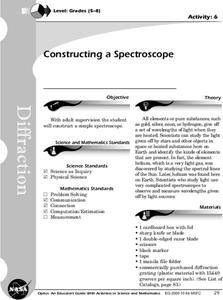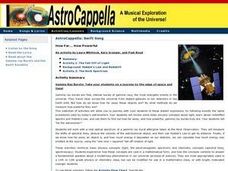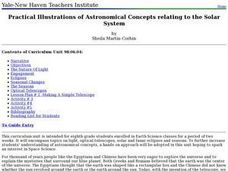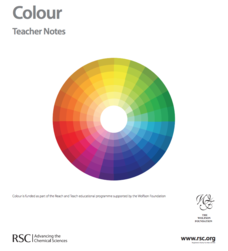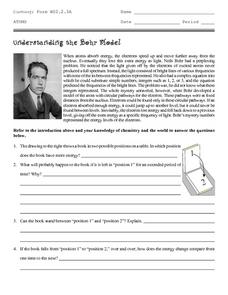Rice University
College Physics for AP® Courses
Take a look at an organized physics course. The 34-section electronic textbook covers material in AP® Physics 1 and 2. Teachers use the text to supplement lectures and have the class work through the labs. Each section contains multiple...
Curated OER
Spectroscopy Demonstrations
Students study light and see what emits photons and that light can be separated onto a spectrum. In this energy and matter instructional activity students identify gases using a spectrum chart.
Curated OER
Projecting Spectra
Pupils use two methods to show and study the colors in the visible spectrum.
Curated OER
Simple Spectroscope
Students make a spectroscope out of simple materials and are expected to view as many different light sources as possible to see the whole spectrum.
Curated OER
Constructing a Spectroscope
Students construct a simple spectroscope. They observe the emission spectrum produce by a source of light.
Curated OER
Color Recognition
Learners envision how space observatories make use of monochromatic filters to collect data on the color of objects in space. They see the actual colors of objects when they are in monochromatic light.
Curated OER
Differential Thermal Calorimetry
Students access prior knowledge of infrared rays, ultraviolet rays, gamma rays, x-rays and cosmic waves. In this electromagnetic waves lesson, students hold a mock trial electromagnetic spectrum. Students present characteristics of the...
Curated OER
Applied Science - Technology (5A) Lab
Fifth graders explore electromagnetic waves and light. For this light lesson, 5th graders draw the parts of a wave of the electromagnetic spectrum. They compare a flashlight to a laser to see how the light looks when shined through...
Curated OER
How Far... How Powerfu
Students work with a real optical spectrum of a gamma ray burst afterglow taken at the Keck Observatory. They measure the shifts of spectral lines, deduce the velocity of the astronomical object, and then use Hubble's Law to get its...
Curated OER
Luminous Efficacy (Efficiency)
Young scholars examine the basics of luminous efficacy and why it is used. For this light source lesson students test energy efficiency and the luminous efficiency for babies.
Curated OER
Integrating Physics-Atomic Fingerprints
In this atomic fingerprint worksheet, learners read about the Bohr model and electrons changing energy levels and emitting energy. They answer questions about the atomic spectrum and the fingerprints for specific atoms.
Curated OER
Online Exploration: Telescopes From the Ground Up
Learners explore a web-based illustrated text and interactive graphics to determine the relationship between the operation of telescopes and light. optics. They work in small groups to become an expert on one of the ten eras of telescope...
Curated OER
Infrared-Hot
Students describe how the sun heats the Earth, explain the nature of infrared light, explain how thunderstorms are formed and use infrared maps to predict severe weather.
Curated OER
Practical Illustrations of Astronomical Concepts Relating to the Solar System
Eighth graders are introduced to concepts related to the Solar System. In groups, they participate in an experiment in which they must describe a ray of light and how it travels. They draw a diagram of the electromagnetic spectrum and...
Curated OER
Rain and Rainbows
Learners explore the weather system by analyzing water properties. In this precipitation activity, students review weather related vocabulary terms and discuss how rainbows are created by light hitting droplets at the right time....
Curated OER
Discovery Matching Worksheet
In this science worksheet, middle schoolers match the vocabulary term on the left side with the definition on the right related to the concept of light.
Cornell University
Building Spectroscope
Given specific materials, scholars follow a set of instructions to build and calibrate their very own spectroscopes. After construction, they test the scope for accuracy and make modifications where necessary.
Towson University
The Crucial Concentration
Which sports drink provides the best pick-me-up after the big game or grueling workout? It may not be the one you'd think! Food science is the focus in a surprising lab activity. Pupils use colorimetry to determine the amount of protein,...
Royal Society of Chemistry
Colour—Gifted and Talented Chemistry
Add a splash of color to your chemistry class! Science scholars discover the principles behind color through a wide variety of hands-on activities. Lessons include dyes, chromatography, and flame tests.
University of Colorado
Enceladus, I Barely Knew You
Use spectral knowledge to make discoveries on a distant moon. Small groups gather information from images of one of Saturn's moons. The moon orbits within the E-ring made up of mainly water ice. Using information about the composition of...
Curated OER
(S-4) The Many Colors of Sunlight
Students observe and explore the characteristics of light.
Curated OER
As the Sun Burns
Students examine the types of light the sun gives the Earth. They describe the electro-magnetic spectrum and how to protect themselves from different types of light. They identify the layers of the atmosphere as well.
Curated OER
Starlight, Star Heat
In this stars worksheet, students read how astronomers calculate the temperature of a star by measuring its color. Students use a chart showing star temperatures and colors to complete 3 short answer questions.
Curated OER
Understanding the Bohr Model
In this Bohr model worksheet, students read about Neils Bohr and the model he proposed of the atom. Students answer nine questions about his theory that electrons travel in orbitals and give off energy when they are excited.
Other popular searches
- Visible Light Spectrum
- Light Spectrum Stars
- Light Spectrum Waves
- Light Spectrum Activity
- Light Spectrum and Colors
- Light Spectrum and Waves
- Newton's Light Spectrum
- Light Spectrum \ Stars
- Spectrum of Light
- Spectrum Light






